Core Competency "Humans and Technology"
Technology is developed by people for people and is used by individuals for their own goals, for cooperating in organizations for common goals and the goals of others, for communication, as an instrument of discovery, and for technically mediated access to the world. Technology is a cultural achievement that has human society as a prerequisite while having an impact on human societies and changing the world as a living space. Chemnitz University of Technology is characterized by strong humanities, economics, and, behavioral and social sciences competencies. These competencies, together with correspondingly oriented engineering, natural sciences, and mathematical key research areas, enable and significantly shape intensive research activities in the core competency humans and technology.
Coordinated, interdisciplinary research projects work out the fundamental knowledge to further develop technology with foresight and in a way that is tailored to the needs of people. The levels of analysis range from individual human-machine interfaces to complex socio-technical scenarios. Simulation and virtual environments serve as scientific methods, which are also used to investigate questions in the behavioral and social sciences. The historical and current technology-driven social developments, the individual and social conditions and effects of technology use and technological innovation are the subject of a wide range of research activities in the humanities, social sciences, and law and economics, which enable valuable and quality-enhancing synergies in interdisciplinary projects.
News
-
Forschung
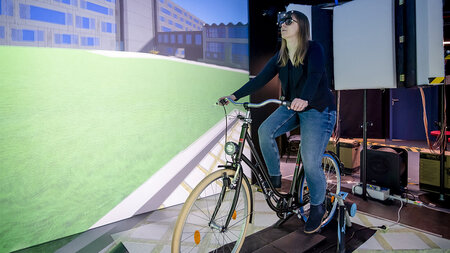 How to Experience Virtual Worlds with More Senses
How to Experience Virtual Worlds with More SensesThe InnoTeam Presence under the leadership of Chemnitz University of Technology develops technologies and processes to increase the feeling of reality in VR.
-
Forschung
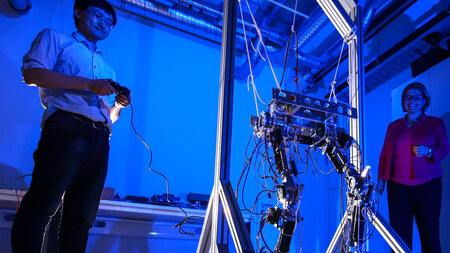 Chemnitz Robotics Researchers Invent New Robot Joint
Chemnitz Robotics Researchers Invent New Robot JointNew patent granted to the Professorship of Robotics and Human Machine Interaction (Prof. Dr. Ulrike Thomas) for compliant robot joint - invention will make human-robot interaction safer
-
Forschung
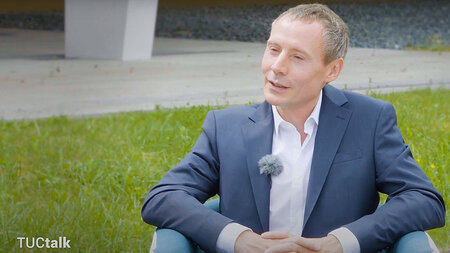 TUCtalk 40 is Online - Subtitles available
TUCtalk 40 is Online - Subtitles availableProf. Dr. Georg Jahn is spokesman of the Collaborative Research Center "Hybrid Societies" at Chemnitz University of Technology and talks about human-machine interaction and embodied technologies in the new episode of TUCtalk
-
Forschung
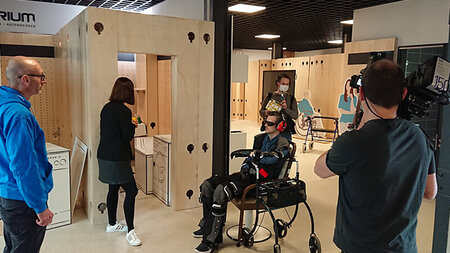 MAXimum Aging for Research
MAXimum Aging for ResearchThe MAX age simulation suit developed at Chemnitz University of Technology helps in the design of barrier-free living spaces - ARTE report will air on "Xenius" magazine on 13 August 2020 at 5:05 pm
-
Forschung
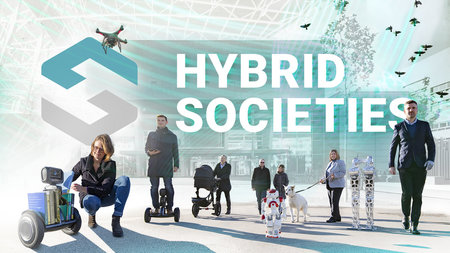 New Collaborative Research Center Approved at Chemnitz University of Technology
New Collaborative Research Center Approved at Chemnitz University of TechnologyThe Hybrid Societies Collaborative Research Center will investigate future forms of interaction between humans and technology – The German Research Foundation will fund its establishment with ten million euros
Key Research Areas in the Core Competency "Humans and Technology"
Using cognitive science experiments, field studies, sensor development, immersive simulations, and neurocognitive modeling based on the brain, researchers at Chemnitz University of Technology are investigating the perception, cognition, and behavior of humans and machines. The development of new sensors and the investigation of sensor systems and multimodal (human) sensory perception is carried out across faculties, covering the whole range from basic research to a variety of applications. Special emphasis is placed on realistic, complex scenarios such as cooperative manufacturing and assistance and automation in road traffic. The Collaborative Research Center Hybrid Societies, established in 2020, investigates the prerequisites and design solutions for the coordinated interaction of humans and machines in public spaces. Other interdisciplinary projects are organized in the Center for Sensing and Cognition.
In virtual environments, human sensory experiences can be extended with measurements gathered from technical sensor technology. Such a coupling affords completely new phenomena to humans. Examples are the transfer of nanoscopic processes to the macroscopic level, the intuitive display of hidden sources of danger, and the restoration of individually lost human sensory capacities. Virtual environments are also an established tool to support innovation and planning processes, such as innovations in resource efficiency. The challenges and opportunities of connecting real and virtual worlds are researched at Chemnitz University of Technology from the perspectives of several disciplines.
New media and digital practices are profoundly shaping today's societies, their lifestyles, and most of their economic sectors and cultural fields. To understand and shape them, it is necessary to analyze, reflect and evaluate recent media ecologies, automation processes, and communication technologies. Chemnitz University of Technology meets the requirements of this highly dynamic area of equally economic, political, and social relevance. It focuses on the long-term conditions of medialization and digitalisation, the far-reaching consequences of such processes, and the development of adequate methods for the analysis of digital data and the technical social environment.
Technology reflection and history of technology explore the conditions of the possibility of technological development. Reflection on technology and its historical background means investigating and discussing the manifold preconditions of technology as well as the diverse interrelationships between technology, the individual, and society. Starting points for this are historical sources, factual and imaginative discourses, and the various forms of practical science and technology transfer. The scientific study of such topics has always been carried out from a metaperspective that looks at the historicity, dynamics, and consequences of technological developments across cultures and epochs. In particular, it takes into account the connection between technological development and economic, political-socio-cultural, and legal changes, but also includes the technologization of the media, the multimodal mediation of technology, and the role of technology in the transfer of knowledge and skills within the framework of societal reproduction.
Mathematical models are necessary to formulate knowledge about real physical systems and entities or systems and entities described by data as well as their structural properties or dynamic interactions. For this purpose, the essential properties are condensed by a small number of controllable and non-controllable parameters in such a way that the model behavior determined by numerical simulation or mathematical analysis makes the observed phenomena explainable and, if possible, predictable with error estimation. This enables the development of mathematical optimization and control methods to influence the behavior in a targeted manner. Numerical procedures for parameter identification, simulation, control, and optimization of discrete, dynamic, or statistical models as well as the analysis of structural properties of these models and procedures form a cross-faculty methodological research focus with project-specific thematic characteristics.
Contact
Speaker of the working group "Humans and Technology":
- Prof. Dr. Marco Ragni
Phone: +49 371 531-38284
Email: marco.ragni@…
Deputy speakers:
- Prof. Dr. Ulrike Thomas
Phone: +49 371 531-31648
Email: ulrike.thomas@… - Prof. Dr. Lewis Chuang
Phone: +49 371 531-31638
Email: lewis.chuang@…
Projects (Selection)
CRC 1410 "Hybrid societies: Humans interacting with embodied technologies"
Funding Agency: DFG
Funding Period: 2020-2023
website
Regionales Kompetenzzentrum "Künstlich und Menschlich Intelligent – Kompetenzzentrum für transformierte Arbeit in Westsachsen (K-M-I)" (Beteiligung)
Funding Agency: BMBF
Funding Period: 2021-2026
website (de)
SPP 2134 "The active self" - project "Dynamic and adaptive body schema by learning to predict the sensory consequences of actions"
Funding Agency: DFG
Funding Period: since 2018
website
SPP 2134 "The active self" - project: "Functional Aspects of the Minimal Self – the Case of Schizophrenia"
Funding Agency: DFG
Funding Period: since 2018
website
"Neuro-computational modeling of perisaccadic visual perception and attention"
Funding Agency: DFG
Funding Period: since 2020
website
"Counterfactual Assessment and Valuation for Awareness Architecture (CAVAA)"
Funding Agency: EU HORIZON
Funding Period: 2022-2026
website
SPP 2305 "Sensor-Integrated Machine Elements pave the way for Widespread Digitalization" - project: "Sensor-integrating feather keys for the detection of torques"
Funding Agency: DFG
Funding Period: since 2021
website
SPP 1921: "Intentional Forgetting in Organizations" - project: "Intentional forgetting through cognitive-computational methods of priorization, knowledge compression and contraction"
Funding Agency: DFG
Funding Period: 2016 – 2023
website
"MANUACT - Hands and Objects in Language, Culture, and Technology: Manual Actions at Workplaces between Robotics, Gesture, and Product Design"
Funding Agency: BMBF
Funding Period: 2015-2018
website (de)
"A neurocomputational systems approach to modeling the cognitive guidance of attention and object / category recognition"
Funding Agency: DFG
Funding Period: 2005 – 2015
website
"Die Rolle von Bildmerkmalen für die Interaktion von Aufmerksamkeit und Objekterkennung unter natürlichen Bedingungen"
Funding Agency: DFG
Funding Period: 2009 – 2014
website (de)

